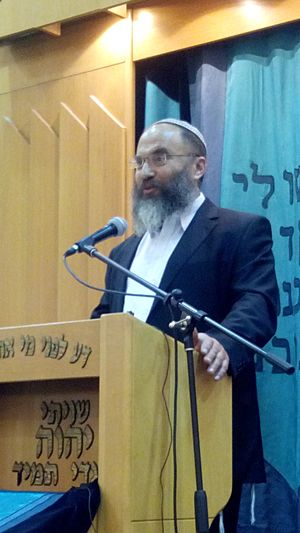Re'em Ha'Cohen facts for kids
Quick facts for kids Re'em HaCohenרא"ם הכהן |
|
|---|---|

Rabbi Re'em HaCohen
|
|
| Religion | Judaism |
| Denomination | Orthodox |
| Personal | |
| Born | 10 March 1957 Jerusalem |
| Senior posting | |
| Title | Rosh Yeshiva of Yeshivat Otniel |
Rabbi Re'em HaCohen is a respected Israeli rabbi. He was born on March 1, 1957. He is known for being a leader in Religious Zionism. This is a movement that combines Jewish religious beliefs with support for the State of Israel. Rabbi HaCohen is the head of Yeshivat Otniel, a special school for advanced Jewish studies. He shares this role with Rabbi Binyamin Kalmanzon. He also serves as the community rabbi for the town of Otniel in Israel.
Contents
Rabbi Re'em HaCohen's Life Story
Early Life and Education
Re'em HaCohen was born in Jerusalem on March 1, 1957. His father, Yedaya, was a principal at Yeshivat Har Etzion. His mother, Dina, led Midreshet Emuna. He grew up in Jerusalem, near the Rehavia and Sha'arei Hesed neighborhoods. As a young person, he often visited the home of the famous Rabbi Shlomo Zalman Auerbach.
He attended Netiv Meir Yeshiva High School. Later, he studied at Yeshivat Har Etzion in Alon Shvut. There, he learned from important teachers like Rabbis Aharon Lichtenstein and Yehuda Amital.
Military Service and Rabbinic Training
Rabbi HaCohen served in the Israeli Armoured Corps. He reached the rank of Major in the Reserves. After his military service, he received his semikhah. This is a special certification that allows someone to be a rabbi. He received it from Rabbi Lichtenstein and Rabbi Eliezer Waldenberg. He also studied with Rabbi Sholom Eisen, a leading expert in Jewish law.
Leadership Roles
Rabbi HaCohen worked as a Ra"m (a senior teacher) at Yeshivat Or Etzion. He also taught at Yeshivat Shvut Yisrael in Efrat. In 1994, he was invited to become a Rosh yeshiva at Yeshivat Otniel. A Rosh Yeshiva is the head of a yeshiva, a school for advanced Jewish learning.
After one of the other leaders was sadly killed that year, Rabbi HaCohen also became the community rabbi for the town of Otniel. He has also worked with an organization called "Circles of Justice." In 2006, he was considered for the role of Chief Rabbi of the IDF. Today, he is a judge for "Kane Lecha Chaver." This is a Torah competition run by Mifal HaPayis.
Rabbi HaCohen's Family
Rabbi HaCohen and his wife, Noa, have nine children. His son, Rabbi Uri HaCohen, is also a teacher at Yeshivat Otniel. Another son, Yoni HaCohen, is a Lieutenant Colonel in the IDF. He commands a battalion in the Paratrooper's unit.
His oldest brother, Gershon HaCohen, is a Major-General in the IDF. His other brothers are also rabbis and leaders in Jewish education.
Rabbi HaCohen's Ideas and Beliefs
Connecting Torah to the World
Rabbi HaCohen believes that learning in a beit midrash (a house of study) should connect to the world outside. He thinks that the inner parts of the Torah (Jewish teachings) should be linked to the outer parts. Because of this, his lessons use many different sources. These can be academic, professional, or from Jewish law and mysticism.
His teaching style encourages students to think for themselves. He uses the Brisker method to study the Talmud. This is a special way of analyzing Jewish law. He also studies Kabbalah, which is Jewish mysticism. He is especially interested in the teachings of the Ramchal, Chabad (especially the Baal HaTanya), and Menahem Azariah da Fano. The ideas of Rav Kook are also very important to his beliefs.
Views on Jewish Law
Rabbi HaCohen has shared his views on several important topics in Jewish law (halacha). He believes that it is generally a good deed to donate organs. He says people should have an organ donor card. However, he adds that organs should only be used with a rabbi's approval. He also teaches that smoking is forbidden because it harms one's health. He requires his followers to wear techelet, a special blue thread on their prayer shawls.
Rabbi HaCohen's Books
Rabbi HaCohen has written several books that share his insights and teachings:
- Badai Ha-Aron - This book contains his thoughts on the Talmud.
- He'elem veGilui - This work discusses how God reveals Himself, from the creation of the world to the giving of the Second Tablets.
- Kol Damamah and LaRahok ve Karov - These books are about the High Holy Days.
- Benai Neviim - This book explores the meaning of prophecy for our time.
- Reeh ve-Yirah - This work focuses on the stories of Abraham and Isaac.
- Derekh Sha'ar Elyon - This book is about the sacrificial offerings and the Temple Service.
 | Georgia Louise Harris Brown |
 | Julian Abele |
 | Norma Merrick Sklarek |
 | William Sidney Pittman |

